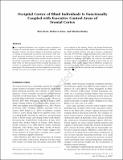Occipital Cortex of Blind Individuals Is Functionally Coupled with Executive Control Areas of Frontal Cortex
Author(s)
Bedny, Marina; Deen, Benjamin Matthew; Saxe, Rebecca R.
DownloadDeen-2015-Occipital cortex.pdf (1.200Mb)
PUBLISHER_POLICY
Publisher Policy
Article is made available in accordance with the publisher's policy and may be subject to US copyright law. Please refer to the publisher's site for terms of use.
Terms of use
Metadata
Show full item recordAbstract
In congenital blindness, the occipital cortex responds to a range of nonvisual inputs, including tactile, auditory, and linguistic stimuli. Are these changes in functional responses to stimuli accompanied by altered interactions with nonvisual functional networks? To answer this question, we introduce a data-driven method that searches across cortex for functional connectivity differences across groups. Replicating prior work, we find increased fronto-occipital functional connectivity in congenitally blind relative to blindfolded sighted participants. We demonstrate that this heightened connectivity extends over most of occipital cortex but is specific to a subset of regions in the inferior, dorsal, and medial frontal lobe. To assess the functional profile of these frontal areas, we used an n-back working memory task and a sentence comprehension task. We find that, among prefrontal areas with overconnectivity to occipital cortex, one left inferior frontal region responds to language over music. By contrast, the majority of these regions responded to working memory load but not language. These results suggest that in blindness occipital cortex interacts more with working memory systems and raise new questions about the function and mechanism of occipital plasticity.
Date issued
2015-03Department
Massachusetts Institute of Technology. Department of Brain and Cognitive SciencesJournal
Journal of Cognitive Neuroscience
Publisher
MIT Press
Citation
Deen, Ben, Rebecca Saxe, and Marina Bedny. “Occipital Cortex of Blind Individuals Is Functionally Coupled with Executive Control Areas of Frontal Cortex.” Journal of Cognitive Neuroscience (March 24, 2015): 1–15. © Massachusetts Institute of Technology
Version: Final published version
ISSN
0898-929X
1530-8898